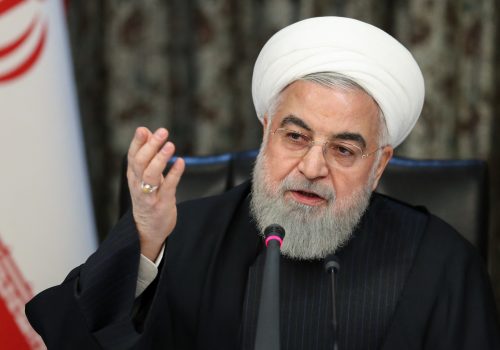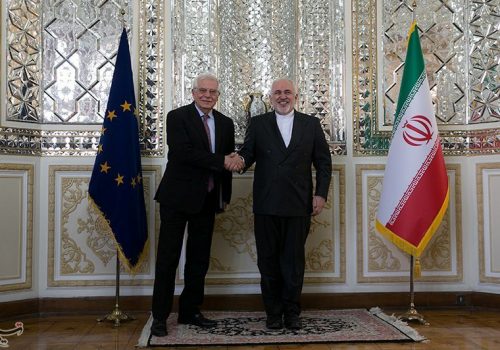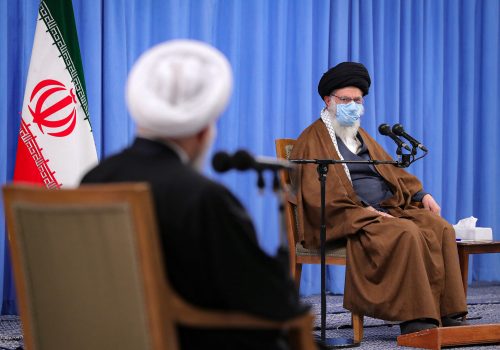Does Russia really want a US return to the Iran deal?
In September 2020, Moscow’s foreign ministry dismissed the United States’ threat to restore United Nations (UN) sanctions (unless the Security Council extended a ban on conventional arms trade with Tehran) as an effort to transform the council into a tool of the Trump administration’s “maximum pressure” campaign.
The Kremlin has also backed European efforts to save the Joint Comprehensive Plan of Action (JCPOA) since the US’s unilateral withdrawal from the deal in 2018. Below the surface, however, Russia’s views may be more complicated and ambivalent. Indeed, Moscow could both gain and lose from President-elect Joe Biden successfully salvaging the JCPOA.
It is useful to go back to July 14, 2015, when the parties to the JCPOA announced the agreement in Vienna. Russia’s Foreign Minister Sergei Lavrov was mysteriously absent. Both Iranian and Russian official media outlets blamed Lavrov’s busy schedule for his absence. But, when Iranian journalists questioned Lavrov’s counterpart Mohammad Javad Zarif, Iran’s chief diplomat refused to comment. Later, some Iranians claimed that Lavrov was disappointed that the deal was only set to lift the UN arms embargo on conventional arms trade with Iran in five years, instead of immediately. Russia was apparently hoping to restart arms sales to Iran from day one.
In addition to Moscow’s disappointment with the extension of the UN arms embargo, Russia did not benefit much economically during the initial post-JCPOA period. From 2015 to 2018, which is when the US reimposed sanctions on Iran, Russian exports to Iran were worth barely more than $5 billion, around 2.5 percent of the $210 billion value of total items exported to Iran during that period. Russia was also frustrated by the JCPOA’s provisions allowing Iran to buy civilian airliners from Airbus and Boeing, which Iran preferred to Russia’s Sukhoi Superjet 100.
After Trump withdrew from the JCPOA though, Iran was forced to turn to China and Russia for more of its trade. In principle, both Beijing and Moscow expressed sympathy with Tehran, but neither offered significant assistance to the Islamic Republic in practice. As a matter of fact, Chinese and Russian banks reduced their transactions with Iran rather than risk loss of business in the US.
Thus, Biden’s intent to return to the JCPOA has mixed implications for Moscow.
With the arms embargo lifted after the failure of US efforts to extend UN sanctions, Russia is optimistic about new opportunities to sell Tehran arms. Exporting weapons and other military equipment to the Islamic Republic is one of the few areas of Iran’s market that Russia can dominate because the US and Europe maintain sanctions on such sales. Among the few countries willing to sell weapons to Tehran, Russia’s defense industry is the most advanced. Iranian military officials have already expressed their desire to purchase Su-30 fighter jets and S-400 anti-aircraft missile systems.
Arms sales to Iran could negatively affect Moscow’s security-economic cooperation with Gulf Cooperation Council states and Israel, but could also provide Russia with additional leverage over Persian Gulf Arab monarchies in the oil and gas market at the same time. In addition to arms sales, Moscow might increase nuclear technology exports to Tehran and obtain more contracts to build nuclear power plants in Iran.
While Russia is a strong opponent of Iran developing nuclear weapons and played a major role in negotiating the JCPOA, a de-escalation of Iran-US brinkmanship coupled with a growth in Iranian-European economic relations could have negative implications for Moscow.
Since the exposure of Iran’s nuclear progress to the world in the early 2000s and the intensification of friction in Iran’s relations with the West, Moscow has used its relationship with Tehran as leverage over Western countries. Therefore, if the US and Europe’s threat perception of Tehran eases, Moscow’s ‘Iran card’ would slowly lose its significance.
In addition to the diplomatic implications of the JCPOA’s reimplementation, energy factors are likely to impact Russia’s material well-being. Oil and gas are responsible for almost 60 percent of Russia’s GDP. Behind Venezuela, Saudi Arabia, and Canada, Iran has the world’s fourth-largest combined oil and gas reserves. Next to Russia, Iran has the world’s second-largest gas reserves. Thus, the return of Iran to global energy markets could constitute a severe challenge to Russia’s oil- and gas-dependent economy.
Iran’s ambitions to increase its market share of hydrocarbons are well-known. In 2011, Iran, through the signing of an agreement with Iraq and Syria for a natural gas pipeline called the Friendship Pipeline (aka the “Islamic gas pipeline”), revealed its plan to supply more European customers from Iran’s South Pars gas field. The civil war in Syria halted the proposed project, but it served as a warning to Moscow that, eventually, Iran will step forward to gain a larger share of the European market for natural gas.
Looking ahead, a US return to the JCPOA in 2021 would be a mixed blessing for Russia. There are many unknowns, such as the extent to which the Biden administration would want to expand the nuclear accord. Although Moscow is unlikely to actively take measures to try to prevent Washington from re-entering the JPCOA, the Russians would be in a strong position to benefit from a continuation of the US remaining a non-party to the deal. At the same time, the Kremlin understands that even if Biden’s administration brings the US back to the JCPOA, Iranian leadership will work hard to try to ensure that the Islamic Republic is not vulnerable to unilateral US actions against Tehran, especially if a Republican wins the 2024 election. The strategic decisions that Iran would have to make in order to achieve this outcome will inevitably entail Tehran strengthening its partnership with Moscow, elevating Iranian-Russian relations to new heights. In sum, one could argue that Russia will find a way to win on the JCPOA dossier regardless of how the forty-sixth American president addresses this nuclear deal.
Arman Mahmoudian is a PhD candidate in International Relations at the University of South Florida, and a research associate at the Center for Strategic and Diplomatic Studies. Arman is also an analyst at Gulf State Analytics. Follow him on Twitter: @MahmoudianArman.
Giorgio Cafiero is CEO of Gulf State Analytics. Follow him on Twitter: @GiorgioCafiero.
Image: Russian Foreign Minister Sergey Lavrov (right) met with his Iranian counterpart Mohammad Javad Zarif (left) in Moscow, Russia on June 16, 2020. Russia will strongly oppose attempts to manipulate the UN Security Council to following the events related to the Joint Comprehensive Action Plan (JCPOA), according to Russian Foreign Minister Sergey Lavrov.


